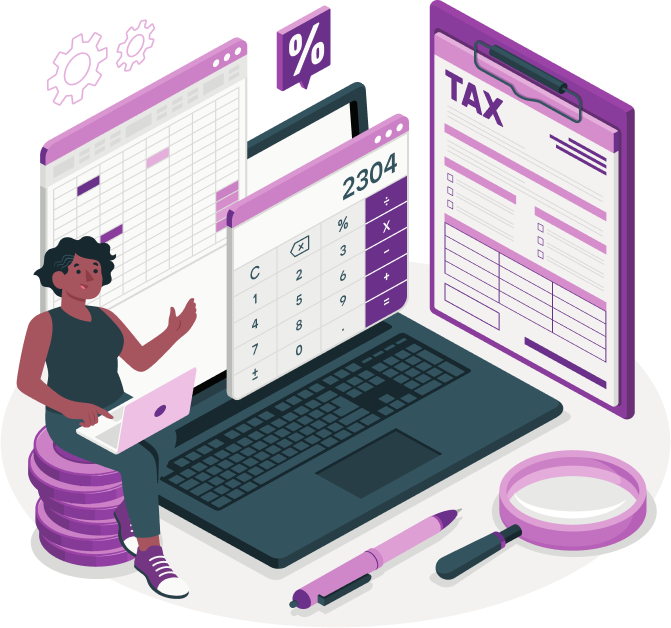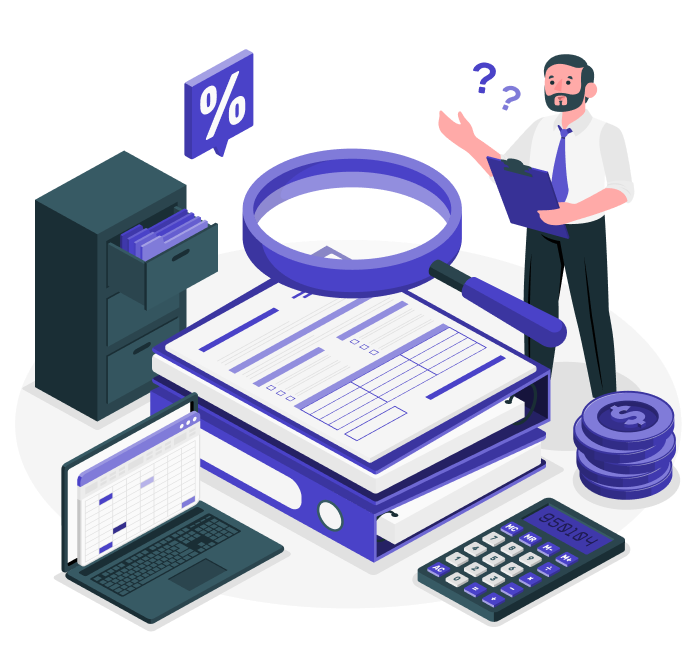Need free consultancy? Book Now

Top 10 Steps to Simplify Your Small Business Accounting | You Must See
Navigating the complexities of small business accounting can often feel like steering a ship in a storm. But fear not, as streamlining your accounting process doesn’t have to seem like a daunting task.
Our quick guide is intended to help small business owners transform their accounting processes into an efficient and stress-free component of their operations. By adopting these steps, you can ensure small business accounting is not just a necessity, but a powerful tool for growth and success.
1. Embrace Cloud-Based Accounting Solutions
Gone are the days of bulky ledgers and endless paper trails. Modern cloud-based accounting platforms offer a transformative solution. They provide instant access to financial data, robust security, and easy integration with other digital tools. This shift to digital record-keeping not only streamlines processes but also guarantees real-time accuracy in your financial records.
2. Maintain Regular Bookkeeping
Maintaining consistent bookkeeping is vital. Frequent updates to your financial records can prevent overwhelming backlogs. Setting aside regular intervals, such as daily, weekly or every other week, for updating your books can greatly simplify your small business accounting routine.
3. Distinguish Between Personal and Business Finances
Blending personal and business finances can lead to confusion. Establishing separate accounts for business transactions is crucial. It simplifies small business accounting processes and provides an unobstructed view of your business’s financial state.
4. Master Budgeting and Financial Forecasting
Effective budgeting and forecasting are not just for large corporations. Small businesses also stand to gain from mastering these skills. Employing budgeting and forecasting tools can offer vital insights into your cash flow, aiding in strategic business decisions.
5. Grasp Essential Accounting Concepts
Familiarity with basic small business accounting concepts, such as assets, liabilities, revenue, and expenses, is beneficial. This understanding aids in deciphering financial statements and contributes to more informed financial decision-making.
6. Leverage AI in Accounting
Integrating AI into small business accounting practices marks a significant leap in efficiency. Our unique AI tool can swiftly process vast data sets, offer immediate financial insights, and minimise errors. This modern approach is redefining how small businesses approach their finances.
7. Conduct Routine Financial Reviews
It’s critical to regularly assess your financial statements, including balance sheets, profit & loss statements, and cash flow statements. This practice helps identify discrepancies early and monitors your business’s financial progress.
8. Optimise Invoicing and Payments
Efficient invoicing and streamlined payment processes are key to maintaining healthy cash flow. Implementing online invoicing solutions that support electronic payments can expedite these processes and enhance overall efficiency.
9. Engage in Continuous Tax Planning
Effective tax management involves constant attention, not just end-of-year efforts. A system that continually tracks tax-deductible expenses and maintains detailed records simplifies tax preparation and alleviates stress.
10. Consult With Financial Experts
Seeking advice from accounting professionals or financial advisors is invaluable. Their expertise can be especially beneficial during significant financial undertakings or complex tax situations.
Conclusion
Transforming your small business accounting from a challenging task to an efficient and manageable part of your business is achievable through these ten steps. Embracing technological advancements, staying organised, understanding financial basics, and seeking expert advice when necessary are fundamental to effective financial management. A streamlined accounting system is a time-saver and a crucial tool in monitoring and enhancing the financial health of your business.
EXPERT CONSULTANCY
Book Your Free Consultation

EXPERT CONSULTANCY
Book Your Free Consultation
Unlock your business’s full potential with a no-obligation consultation. Get expert guidance towards smarter, faster, more effective financial solutions.
services
What We Offer

Accounts Payable
At GenZed, we manage your accounts payable process with precision and care, making it easy for you to stay on top of your finances. Whether you prefer to be hands-on or leave it to us, we align payment schedules with your cash flow, manage company credit cards and staff expenses, and ensure all supplier invoices are attached to your accounting system. Using advanced tools like Dext, Hubdoc, and other receipt management software, we streamline and automate invoice and expense handling. Allowing you more time to focus on growing your business effortlessly.

Accounts Receivable
At GenZed, we understand maintaining healthy cash flow and strong client relationships is critical to success. Our Accounts Receivable service is designed to streamline your invoicing and collections process while managing the essential relationships between your business and your clients’ finance team. By blending expert oversight with advanced technology, we take care of everything from daily bank reconciliations to proactive client follow-ups, ensuring you receive payments promptly, improving your cash flow, while preserving positive relationships with your clients.

Advisory
Our Advisory services combine personalized guidance with the precision of advanced technology for data-driven insights. We take the time to identify and understand your unique business needs, offering tailored financial strategies that drive growth. Whether you’re looking to streamline operations, manage risks, or explore investment options, our expert team is here to make valuable suggestions and guide you through potential avenues, ensuring your business thrives every step of the way.

Ad-hoc Analysis
At GenZed, we understand that every business has unique data needs. Our Ad-hoc Analysis service provides the tailored insights necessary for well-informed decision-making. By building a strong foundation with accurate and timely bookkeeping, we ensure that your data is always accessible when you need it. We collaborate closely to identify the specific data that will benefit your business. We remain flexible as situations evolve, providing the right data to support your strategic decisions.

Bookkeeping
As your finance department on demand, we’ll meticulously manage every aspect of your bookkeeping to ensure accurate, timely, and comprehensive financial records. From billing and payments to credit control, staff expenses, and revenue, we handle all financial transactions within your business. We also leverage AI to check transactions for accuracy, consistency, and correct VAT recovery, identifying any overcharges or missed claims. By building a strong bookkeeping foundation, we enhance data quality, leading to more insightful reporting and smarter business decisions.

Budgeting & Forecasting
Our Budgeting and Forecasting service is designed to provide SMEs with a strategic roadmap for financial success. We work closely with you to create detailed budgets and forecasts that align with your specific business goals. By leveraging precise data, accurate management accounts, and advanced technology, we ensure that every forecast is tailored to your unique needs. Our collaborative approach, supported by interactive dashboards, insights, AI-driven data, and scenario planning, allows you to explore different financial outcomes with confidence.

Cashflow Management
We provide comprehensive Cashflow Management services for SMEs that offer both short and long-term financial insights. Our short-term forecasts account for every penny and are monitored for daily movements, giving you a consistently accurate view of your cash position over the next 3-4 months. Our long-term cashflow forecasts are part of our budgeting process, providing a clear monthly view of your finances for up to five years. With our customised scenarios, you can see how different financial decisions will impact your business’s stability and growth, allowing for informed and strategic planning. Our LLM-powered system can give you instant answers to cashflow questions, enhancing your understanding as you need it.

Cap Table Management
At GenZed, we provide comprehensive Cap Table Management services that simplify the complexities of equity ownership in your business. Our intuitive dashboard offers real-time visibility into your cap table, ensuring you have clarity on every movement. We provide tailored support to manage dilution, forecast future dilution scenarios, and handle various share schemes, including EMI schemes. Our approach ensures that your cap table is always accurate and up-to-date, allowing you to focus on strategic decisions while we manage the details of your equity structure.

KPI Management
Our KPI Management service helps you track, analyse, and achieve your business goals with precision. We build on a foundation of accurate bookkeeping and detailed management accounts to ensure your key performance indicators (KPIs) provide actionable insights. Leveraging advanced technology, including interactive dashboards and AI-driven tools, we make it easy to monitor your KPIs in real time. Our customised reporting and expert scenario planning empower you to make informed decisions that drive business growth.

Management Accounting
At GenZed, we believe that accurate management accounting is crucial for driving effective business decisions. Our approach is built on precise data, strong processes, and continuous improvement. We leverage our proprietary technology and AI to turn your management accounts into powerful decision-making tools. We adhere strictly to deadlines, ensuring your accounts are prepared on time, every time. Our intuitive dashboard offers in-depth financial insights, and our reporting process prioritises actionable commentary just as much as the numbers themselves.

Payroll Management
Our Payroll Management service ensures your employees are paid accurately and on time, with all wage calculations, deductions, and tax compliance handled seamlessly. Our fully-managed service also provides support to employees, by addressing any payroll-related queries. By leveraging advanced technology, we streamline the payroll process. Our service is designed to manage payroll efficiently, allowing you to focus on other aspects of your business.

VAT Returns
Managing VAT can be a daunting task, especially with frequent transactions and complex VAT regulations. At GenZed, we simplify the VAT process for SMEs by combining advanced AI technology with human expertise to ensure every transaction is accurately recorded and all legally reclaimable VAT is captured. Using tools like Dext and Hubdoc to process invoices and receipts, our team reviews every entry, while AI verifies the accuracy of VAT applications. This meticulous approach helps your business stay compliant, maximise VAT reclaims, and ensures audit readiness.
NEWSLETTER
Subscribe to Our Newsletter

NEWSLETTER
Subscribe to Our Newsletter
Receive expert tips and insights on accounting and bookkeeping to help grow your business with confidence.